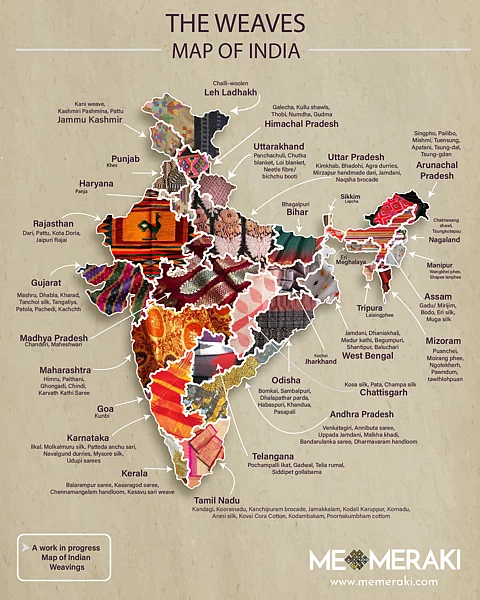
- HOMEGROWN WORLD
- #HGCREATORS
- #HGEXPLORE
- #HGVOICES
- #HGSHOP
- CAREERS
- ABOUT US
- CONTACT US

The weaves of India represent a rich tapestry of cultural heritage and craftsmanship, reflecting the diverse traditions and histories of the subcontinent. Each region in India boasts its unique weaving techniques, patterns, and materials, resulting in a variety of textiles that are both artistically exquisite and functionally versatile. While some weaves are well-known, others live in obscurity. As part of our mission at Memeraki to protect our artistic heritage, we collated all the weaves we know of with this map.
Weaving is an ancient technique that has been used for textiles all over the world for centuries. Weavers use a variety of materials, including thread, yarn, and fabric, to create intricate patterns in cloth. While the process may be simple in theory, weaving can be quite complex and require a great deal of skill.
In India, weaving is a long-standing tradition that has been passed down through the generations. The country is known for its intricate weaves and stunning textile production. The first evidence of weaving in India dates back to the Indus Valley Civilization, which was active from 3300-1300 BCE.
Back then, the main purpose of weaving was to create clothing and fabric for use in everyday life. However, over time, weaving has come to be seen as a form of art, and Indian weavers have become highly skilled at creating beautiful and intricate patterns. The end result is a stunning piece of cloth that can be used for clothing, bedding, or home decor. Whether it is Bengal or Hyderabad, handloom weavers of India have been facing the same kind of problems. From being symbols of cultural expansion to having their thumbs cut off by Englishmen, Indian weavers have endured and persisted through major political upheavals in the subcontinent.
Today, weaving is not only a traditional craft but also a popular hobby, enjoyed by many people all over India. There are many different types of weaves, and each has its own unique look and feel. If you're interested in learning more about these amazing art forms, keep reading!
Gujarat
Mashru Weaving
Dhabla Shawl Weaving
Kharad Weaving
Tanchoi Silk Weave
Tangaliya Weave
Patola weave
Pachedi Weave
Kachchh Shawls
Kutch Weaving
Rajasthan
Dari weaving
Pattu Weaving
Kota Doria Weave
Jaipuri Rajai Weave
Jammu and Kashmir
Kani Weave
KashmirI Pashmina
Pattu weave
Uttar Pradesh
Kimkhab Weave
bhadohi carpets
Mirzapur Handmade Dari
Agra durries
Jamdani weaves
Naqsha brocade weaving
Tanchoi
Manipur
Wangkhei phee weave
Shapee lanphee
Karnataka
Ilkal Weave
Molkalmuru Silk Weave
Patteda anchu sari weave
Navalgund Durries
Mysore Silk Weave
udupi sarees
Leh Ladakh
Challi-Woolen Weaving
Punjab
Khes Weave
Arunachal Pradesh
Singpho Weaving
Pailibo Weaving
Mishmi weaving
Tuensung shawls
Apatani
Tsug-dul and Tsug- gdan
Haryana
Panja Weave
Nagaland
Chakhesang shawl
Tsungkotepsu
Goa
Kunbi weave
Assam
Gadu or Mirijim weave
Bodo Weaving
Eri Silk Weaving
Muga Silk Weaving
Maharashtra
Himru Weave
Paithani Weave
Ghongadi Weave
Chindi Dhurries
Karvath Kathi Sari Weaving
Tamil Nadu
Kandagi Weave
Koorainadu Weave
Kanchipuram Brocade Weave
Jamakkalam Weave
Kodali Karuppur Weave
Kornadu Weave
Arani Silk Weave
Kovai Cora Cotton Weave
Kodambakam
Poornakumbham cotton weaving
Himachal Pradesh
Galecha
Kullu Shawls
Thobi
Numdha
Gudma
Uttarakhand
Panchachuli Weave
Chutka Blanket
Loi Blanket
Neetle fibre weaving or bichchu booti weaving
Kerala
Balarampur Saree Weaving
kasaragod saree weave
Chennamangalam handlooms
Kasavu Sari Weave
Daman and Diu
Mat Weaving
Meghalaya
Eri weave
Tap-moh khlieh
Mizoram
Puanchei
Moirang phee
Ngotekherh
Pawndum
Tawlhlohpuan
Tripura
Laisingphee Weaving
Sikkim
Lepcha Weave
Andhra Pradesh
Venkatagiri Weave
Annibuta Saree Weave
Uppada Jamdani Weave
Malkha Khadi
Bandarulanka Saree
Dharmavaram Handloom
Telangana
Pochampalli Ikat Weaving
Gadwal Weave
Telia Rumal
Siddipet gollabama
Odisha
Bomkai Weave
Sambalpuri Weave
Dhalapathar Parda Weave
Habaspuri Saree
Khandua Weave
Pasapali Saree
Bihar
Bhagalpuri Weaving; Sikki Weaving
Chattisgarh
Kosa Silk Weave
Pata Weave
Champa Silk Weave
Madhya Pradesh
Chanderi Weave
Maheshwari Weave
West Bengal
Jamdani Weave
Dhaniakhali Weave
Madur Kathi weave
Begumpuri Weave
Shantipur/Santipore Weave
Baluchari Weave
Jharkhand
Kuchai Silk Weave
About MeMeraki:
MeMeraki (www.memeraki.com) is India’s first ‘culture-tech’ platform using technology to empower and accelerate the artisan creator economy. Their mission is to digitize every heritage art and craft of India to ultimately create sustainable livelihoods for artisans.
MeMeraki's north star is to enable the master artists of India to have a strong digital identity through their work so that these artists can be digital creators for the very first time and have access to a global audience as patrons of their art. Through this process they hope to create new revenue and sustainable income streams for the second biggest employment generator in the country - the craft economy. To do this, they leverage technology scalably while also ensuring that they address United Nation Sustainable Development Goals 1, 12, 10 and 5.
MeMeraki are reimagining the future of the artisan creator economy with artisans as digital creators.
You can follow MeMeraki on Instagram here.
You can find out more information about their workshops, classes, digital creators, and everything else they have going on here.
